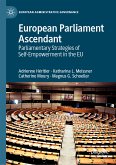-Manuela Caiani, Professor, Scuola Normale Superiore, Florence, Italy
Is Euroscepticism still suited to analyze the variegated nature of opposition to the EU? Starting with this question, this book critically reviews Euroscepticism, reconceptualizes it in terms of political opposition and discovers, disentangles and explains patterns of EU-opposition within the European Parliament (EP). Distinguishing between "what the EU does" and "what the EU is", the research elaborates an index of parties' positioning, "measuring" it through the speeches that parties' deliver in the EP. The EP is the "perfect laboratory" where decisions concerning EU-policies are taken and the future EU-trajectories are shaped. Besides delineating a set of guidelines categorizing parties, the book concludes that their positioning varies along two main axes: the pro-anti-EU-system and the pro-anti-EU-establishment. From a normative perspective, the research argues for the growing importance of the "cumulation hypothesis": if criticism remains unheard within the European elitist construct, such criticism will transform itself into rejection. Benedetta Carlotti holds a PhD in Political Science and Sociology from the Scuola Normale Superiore, Florence, Italy. She is currently a Data Analyst in a private company located in Florence where she deepens text analysis methods. Her main research interests concern positioning toward the EU with a special focus on extremist and populist parties. She has engaged in research collaboration with the University of Siena and with the Scuola Normale Superiore. Her work has been published in the Italian Political Science Review, European Political Science Review and Italian Political Science.
Dieser Download kann aus rechtlichen Gründen nur mit Rechnungsadresse in A, B, BG, CY, CZ, D, DK, EW, E, FIN, F, GR, HR, H, IRL, I, LT, L, LR, M, NL, PL, P, R, S, SLO, SK ausgeliefert werden.









